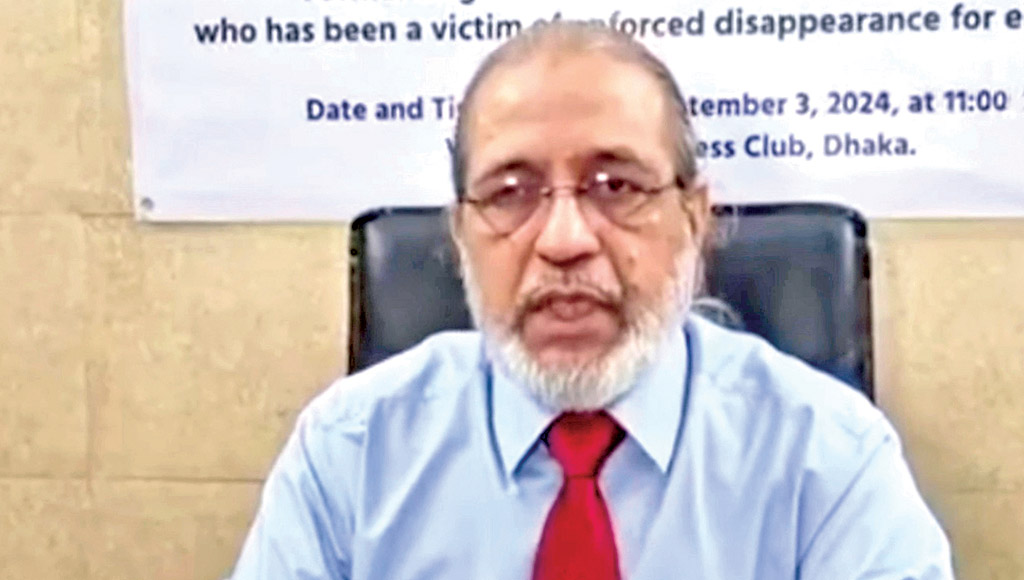Justice is not a privilege; it is a right. And I will not stop until it belongs to everyone.
Justice is not a privilege; it is a right. And I will not stop until it belongs to everyone.
Justice is not a privilege; it is a right. And I will not stop until it belongs to everyone.

His sad life story is a testament to the intimidation strategies that the Bangladeshi government adopted to suppress dissenting views. Abdullahil Amaan Azmi is said to have disappeared in 2016 due to an enforced disappearance that was part of The Awami League’s political strategy. An officer of the Bangladeshi army, Azmi was an enforced disappearance victim. He did not go missing; he was abducted. His abduction, the months of torture, and eventual release are sad retellings of the posture of the regime and its intelligence agency, the Directorate General of Forces Intelligence (DGFI).

Even to this day, the families of the people who are sensitive to the state “political theater” have so many unanswered questions that remain unanswered. Azmi was self-smarted by some men in authority, who looking every bit like DGFI agents in the middle of the night from his residence. Along with him, his family was equally dumbfounded as to where he might be. What is worse is the fact that Azmi was kept in what can be called a secret ‘Aynaghar.’ It was infamous because there is political violence and it is used as a transit space for victims of different agitations. Dhaka has a terrible reputation for enforced disappearances done with the auspices of the Awami League Government, and so the opposition party members, journalists and other outspoken members simply disappear for long diffused periods of time before returning, if they choose to.
Azmi’s disappearance is important to his family due to his father’s background as Ghulam Azam who was a significant leader of Jamaat-e-islami and an enemy of Awami League. He did not abduct Azmi for personal vengeance; he used it as a tool to signal to the opponents that Azmi’s government would not allow defiance, which shows how far the Awami League and its institutions go to dominate the society. It is also evident from such cases that the ruling party Awami League has put its hand on almost all the human rights abuses.
These children capture dreadful abuse by the state as the ruling party Awami League has a resemblance to a fascist regime. The Perpetrator of the State commits unimaginable and horrendous violence, including enforced disappearance, extrajudicial execution, torture, and unlawful arrest and detention. Under the power of Prime Minister Sheikh Hasina’s rule, there has been reported numerous claims of use of violence – mass murder, torture, and unlawful capture – and, excessive batoning goes unpunished. The DGFI serves as an extension of the government to fulfill politically motivated vindictiveness. Opposition in any form is greeted with brutality, making Bangladesh a police state under control of the Awami League.
The way he was detained at the ‘Aynaghar’ illustrates the use of terror in a systematic way that the government employs to control the society. It is known to many through testimonies of camp’s survivors that these centers are places where people are tortured by beating, electric shocks, and constantly being put in solitary confinement. These inhumane techniques are meant to crush the will of those who against to the ruling government.
Azmi’s long awaited release came after years of uncertainty, but his release is devoid of judicial justice. It was done under suspicious conditions that were concomitant with Prime Minister Hasina’s absence from the country. This brings up the question of whether Azmi’s release was a part of some political play that was intended to evade international scrutiny, all the while keeping the repression status quo.
Azmi’s case encapsulates the deeper human rights crisis of Bangladesh. It shows the depths to which the Awami League and its intelligence forces will go to cling onto power through the use of enforced disappearances as a method of political subjugation. The rest of the world should respond to the many violations by the Bangladeshi government and put pressure on them to omit such actions from their playbook. The story of Abdullahil Amaan Azmi is not merely the tale of one individual, but rather, a representation of the multitude of people suffering at the hands of an oppressive regime that brutally silences dissent using terror.